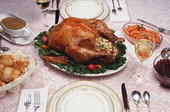- 8 Ways to Increase Dopamine Naturally
- 7 Best Breads for Maintaining Stable Blood Sugar
- Gelatin vs. Collagen: Which is Best for Skin, Nails, and Joints?
- The Long-Term Effects of Daily Turmeric Supplements on Liver Health
- Could Your Grocery Store Meat Be Causing Recurring UTIs?
- Are You Making This Expensive Thermostat Error This Winter?
- Recognizing the Signs of Hypothyroidism
- 10 Strategies to Overcome Insomnia
- Could Artificial Sweeteners Be Aging the Brain Faster?
- Techniques for Soothing Your Nervous System
Exercise May Not Stave Off Holiday Weight Gain


Hoping to counter all those Thanksgiving calories with extra exercise?
A recent study suggests the strategy may not keep off holiday pounds.
Researchers followed 48 men and 100 women for the six weeks between the Thanksgiving and New Year’s celebrations. They ranged between 18 and 65 years of age.
Half reported being serious, regular exercisers. On average, they said, they worked up a sweat almost five hours each week, nearly double the amount of moderate physical activity recommended by the American Heart Association. The other half copped to being couch potatoes.
Researchers weighed and measured each person to calculate their body mass index (BMI) before and after the holidays. They also gauged their percentage of body fat and took their blood pressure.
From mid-November to early January, people in the study gained an average of one-and-a-half pounds. Men gained slightly more, around two pounds each, while women gained a little less, about a pound apiece.
A pound or two may not sound so bad, but studies have found that on average, people gain about two pounds each year. It’s called weight creep. And studies have found that once most people put it on, they never take it off.
After 10 years of small annual increases, that’s an additional 20 pounds of fat. That means holiday weight gain could be a more important factor in the obesity epidemic than many people realize, said researcher Jamie Cooper, an assistant professor of nutritional sciences at Texas Tech University in Lubbock, Texas.
People who were obese at the start of the study had the biggest increases in weight. They also had significant rise in their percentage of body fat. In fact, starting weight was the best predictor of how much weight and body fat a person might gain.
Exercise had no significant impact on holiday weight gain. Researchers aren’t entirely sure why.
On the one hand, Cooper said it could be that the study didn’t have enough participants to detect small differences in weight change between exercisers and non-exercisers.
But she said the results could also mean that people were just eating far more calories than they could burn off, even with all that physical activity.
“If you think about going for a run, if you run for 30 minutes and you run three miles during that time, you burn about 300 calories. Well, one piece of pumpkin pie without anything on it is about 300 calories,” Cooper said. “So, it’s really easy to eat all those calories that you burn during exercise and then some.”
Exercise also boosts appetite, which can lead to even more overeating.
Cooper said that means there really is no substitute for moderation during the holidays, a time when foods are much more likely to be loaded with fat and sugar and hidden calories.
Despite the disappointing results, one expert said the study shouldn’t be an excuse for people to abandon their workout routines over the next few weeks.
“Exercise has numerous benefits beyond just regulation of weight,” said Joy Dubost, a nutritionist and spokesperson for the Academy of Nutrition and Dietetics.
The study found that exercisers may have maintained an advantage over non-exercisers: Their blood pressure tended to stay lower through the holiday hustle.
Dubost thinks that the problem with the holidays isn’t just a big meal here or there, it’s a mindset of indulgence that people tend to adopt between now and the end of the year.
“Typically what happens on Thanksgiving Day doesn’t necessarily just stay for that day. It tends to trickle into an eating pattern that can stay with you through the holiday season,” Dubost said.
“Then you step on the scale and it’s gotten away from you,” she added.
The study was published recently in the European Journal of Clinical Nutrition.
More information
For more on weight management, head to the U.S. Department of Health and Human Services.
Source: HealthDay
Copyright © 2026 HealthDay. All rights reserved.










